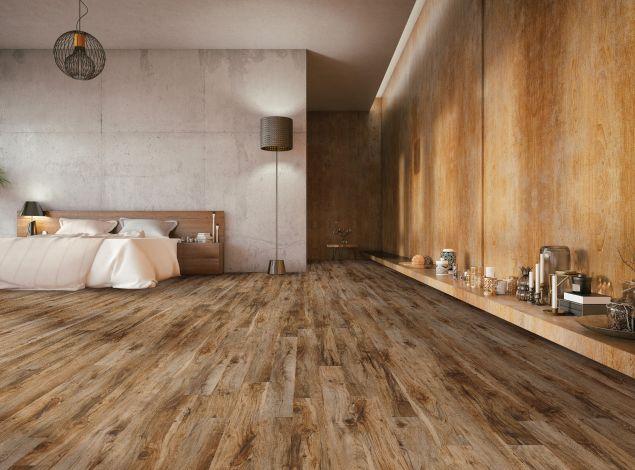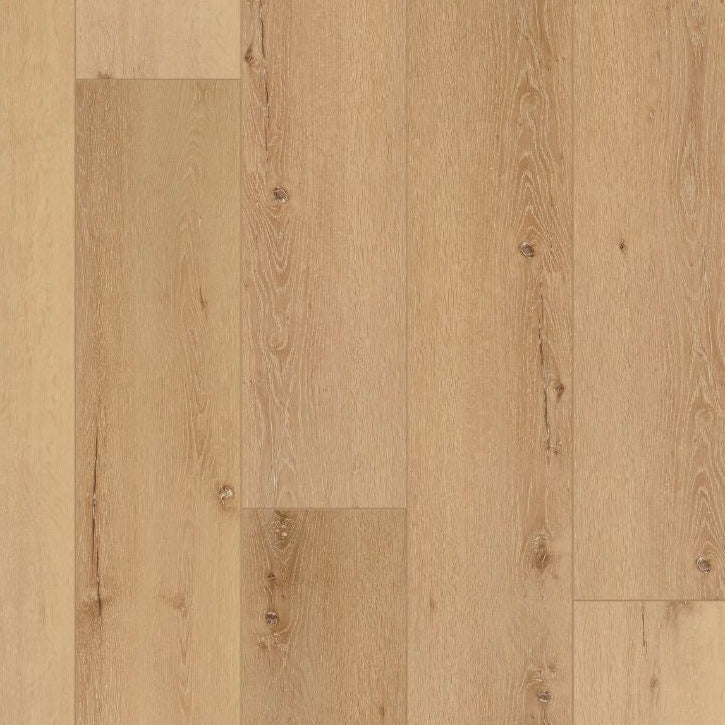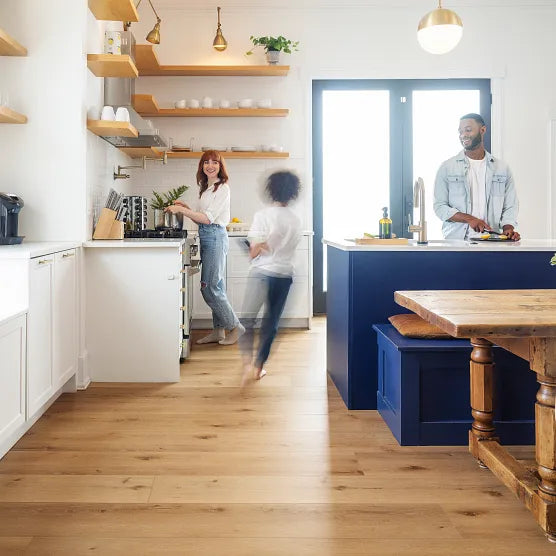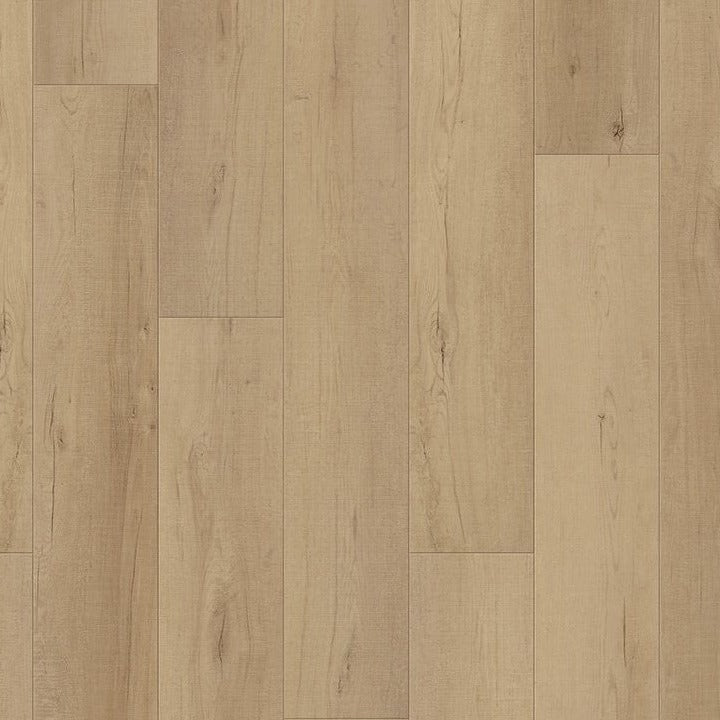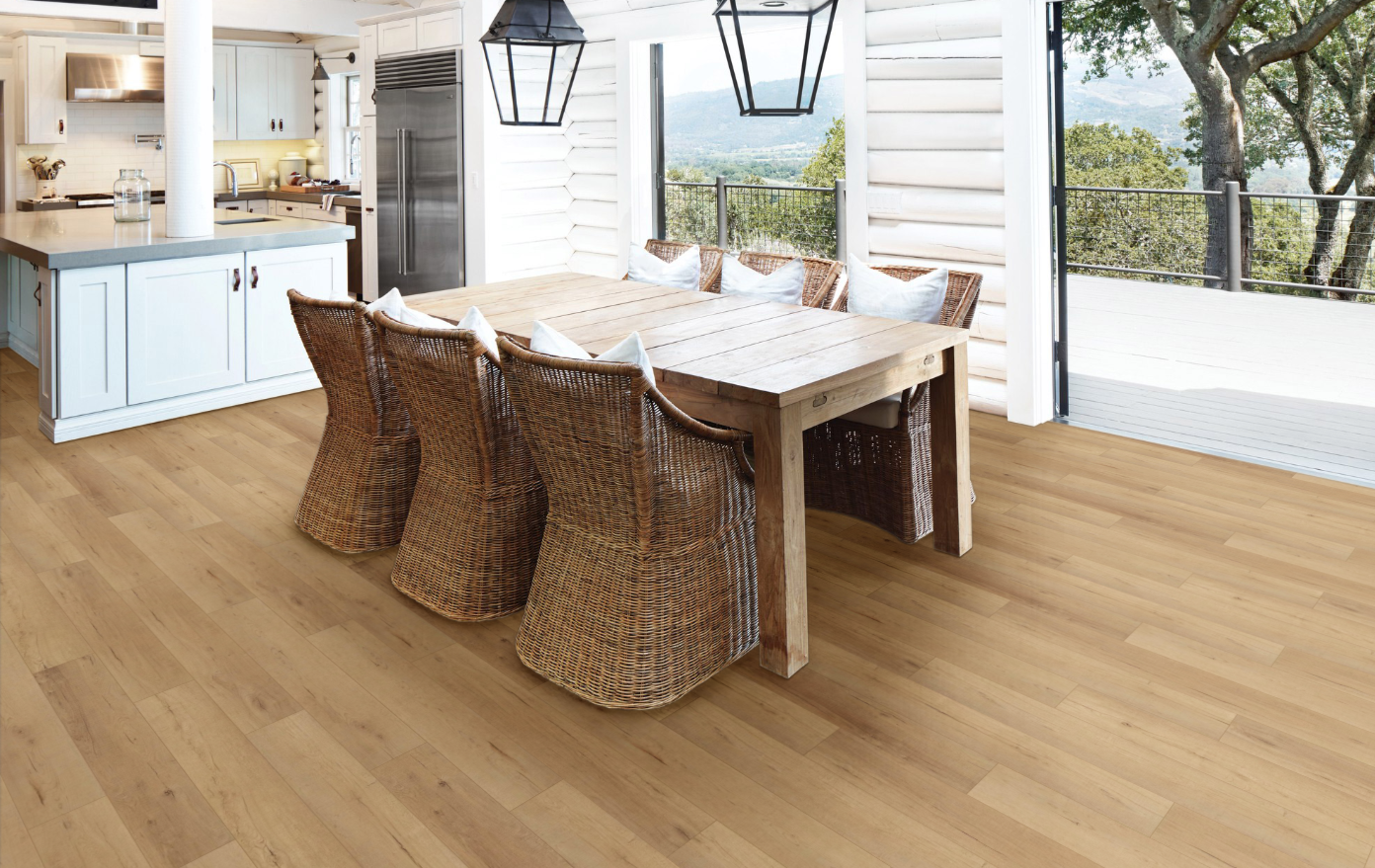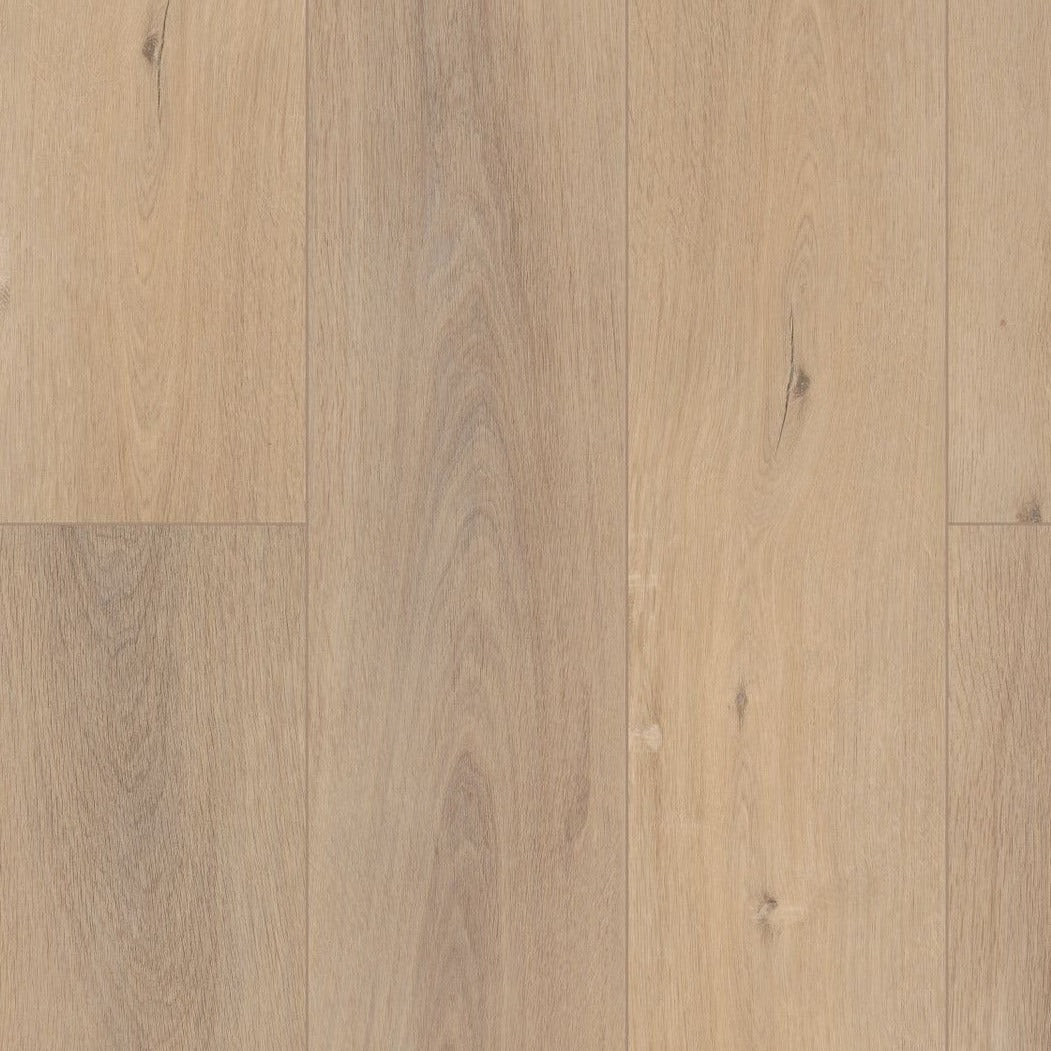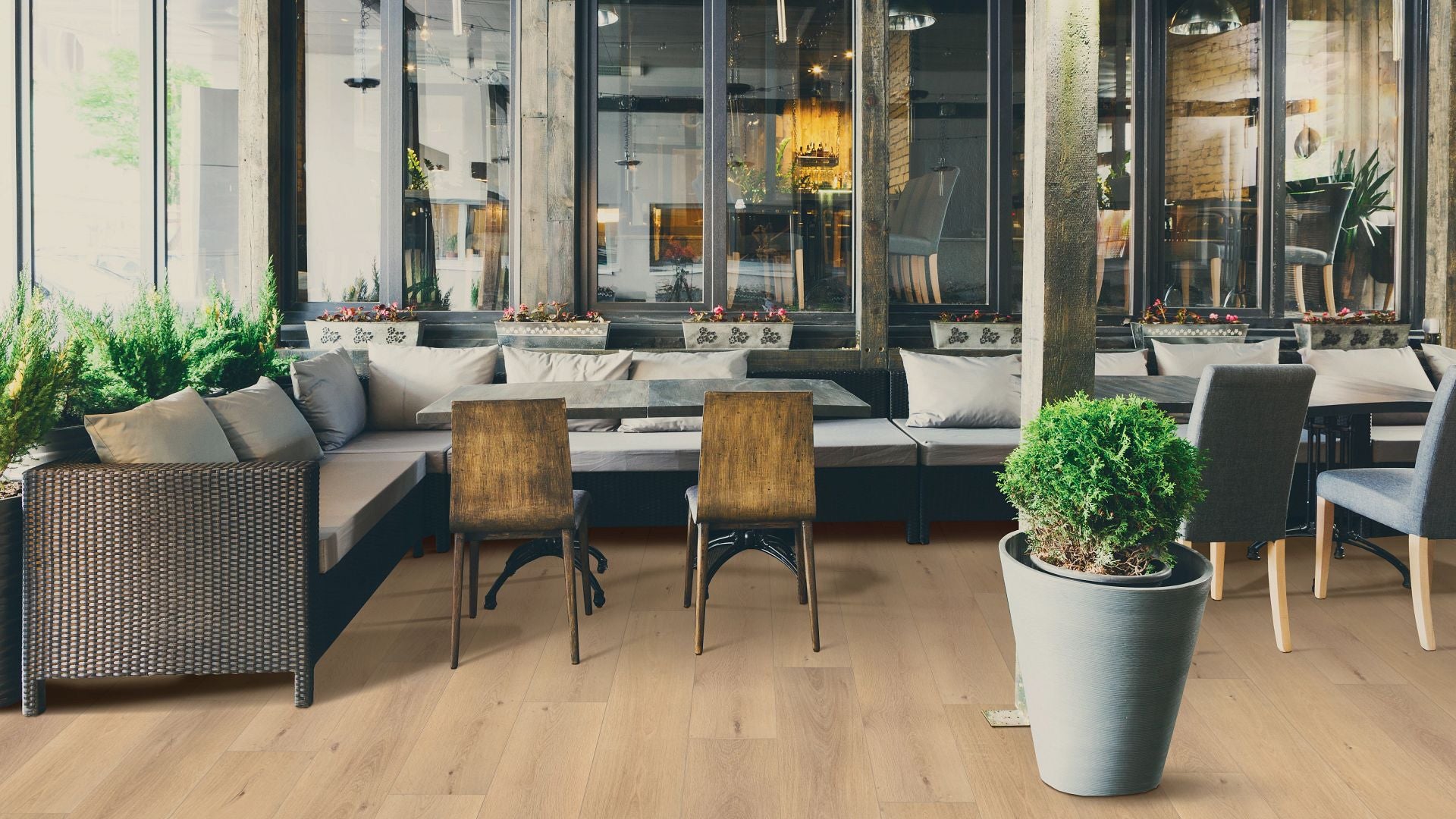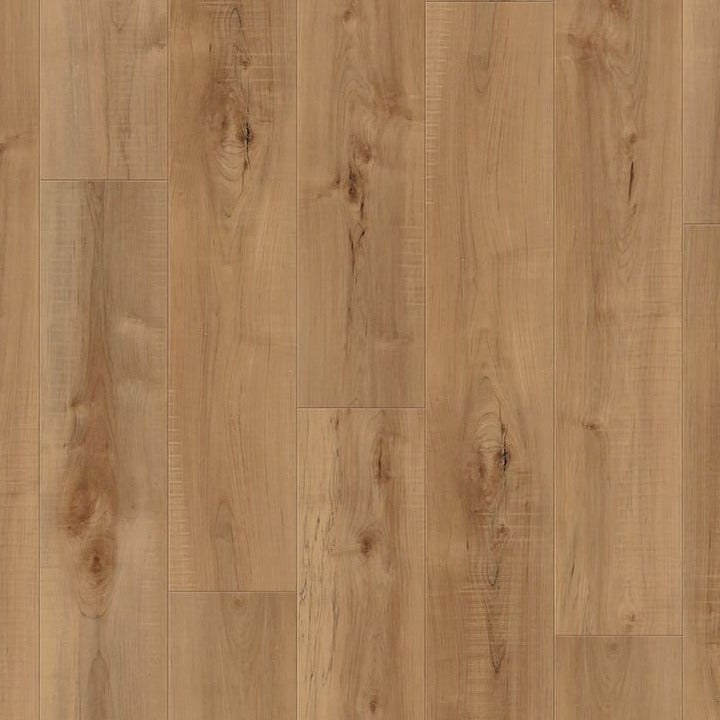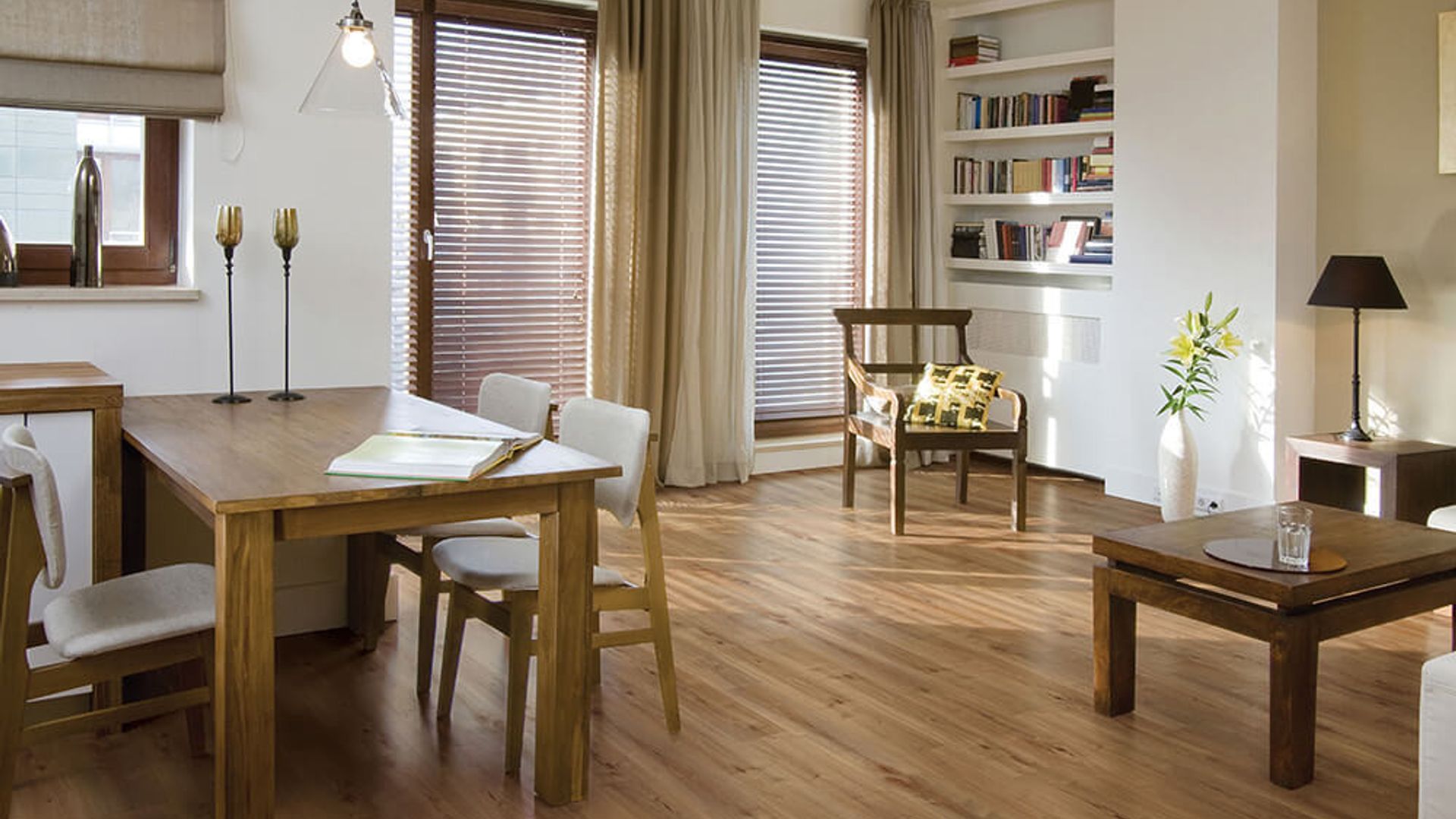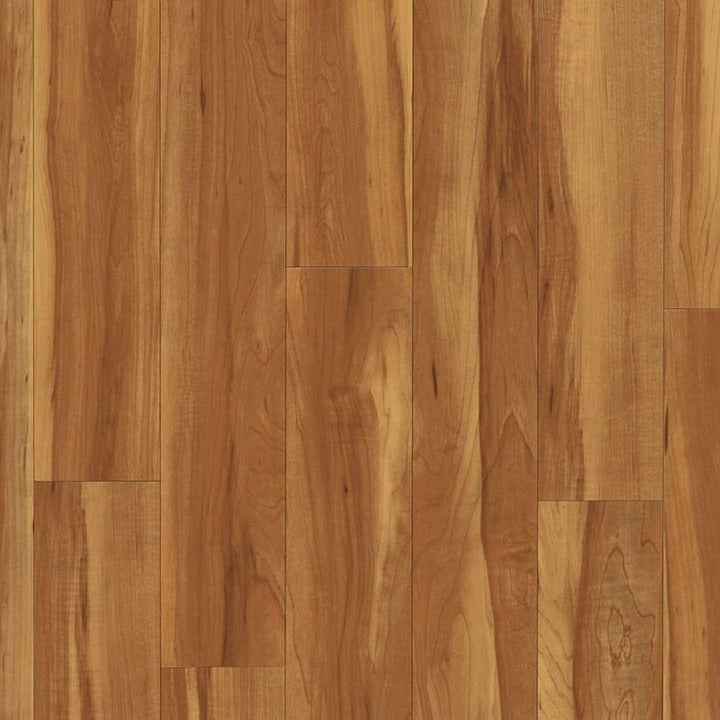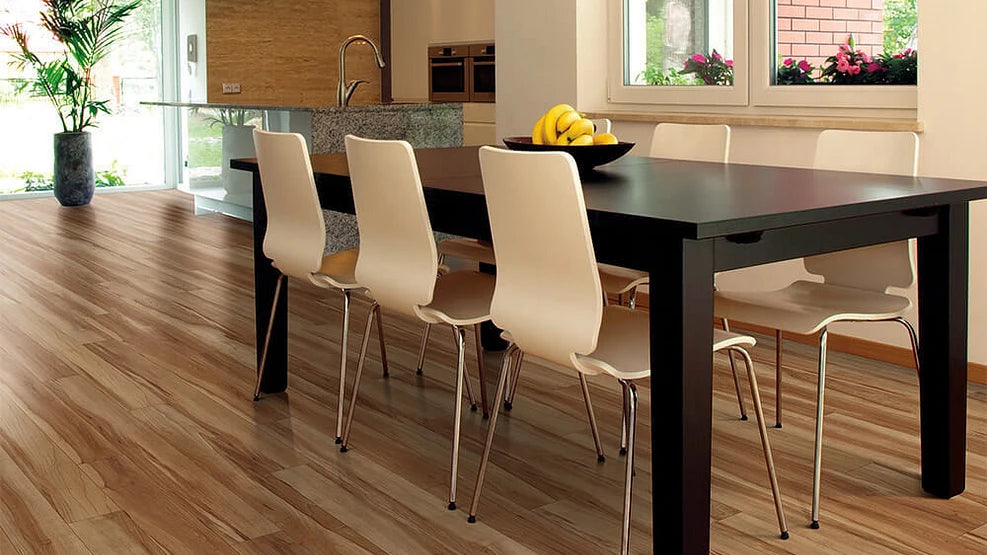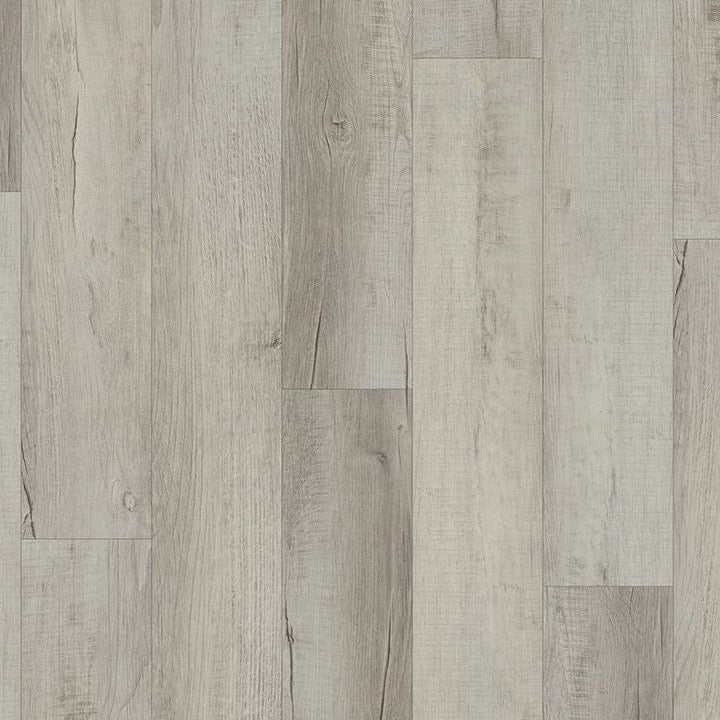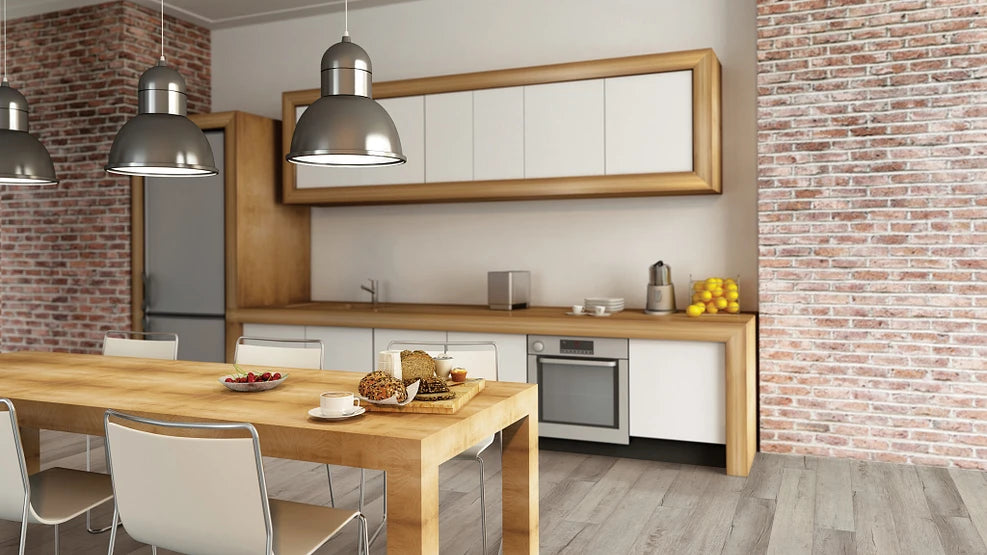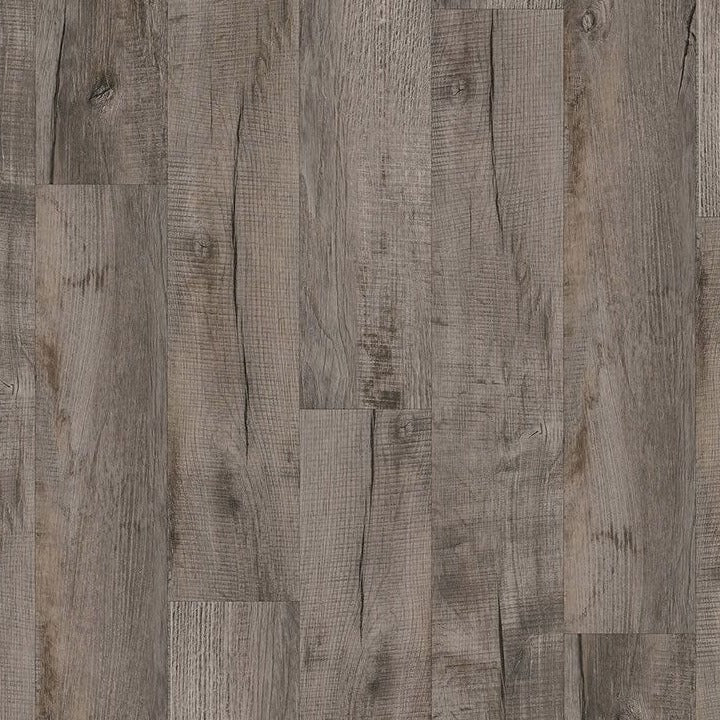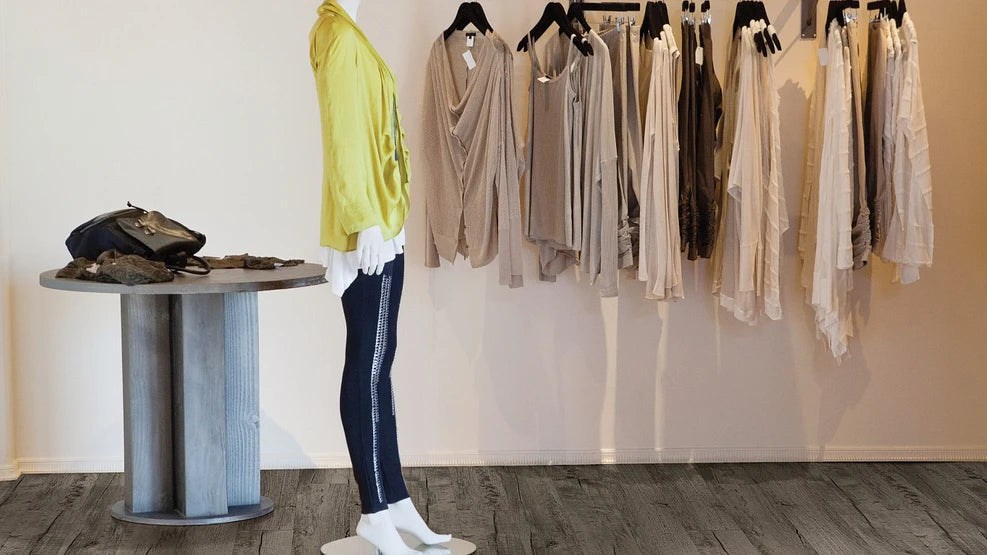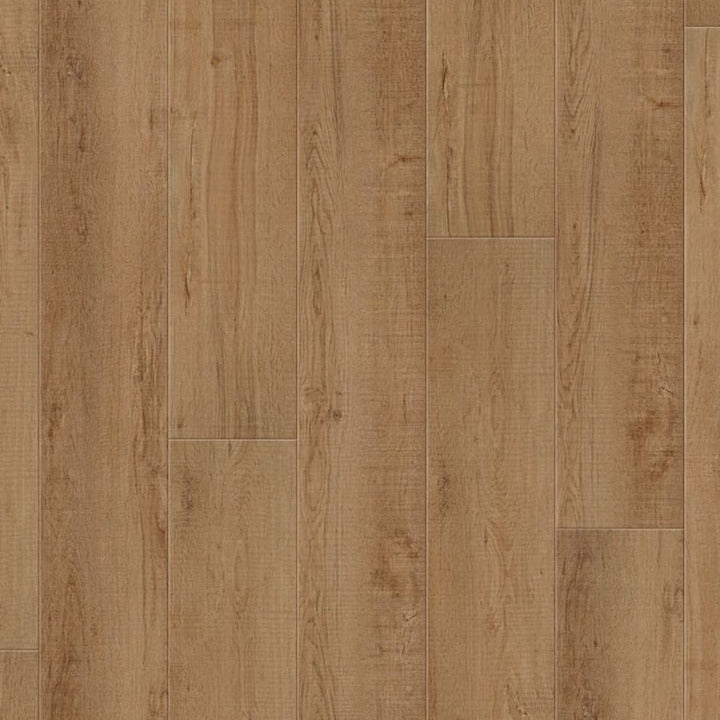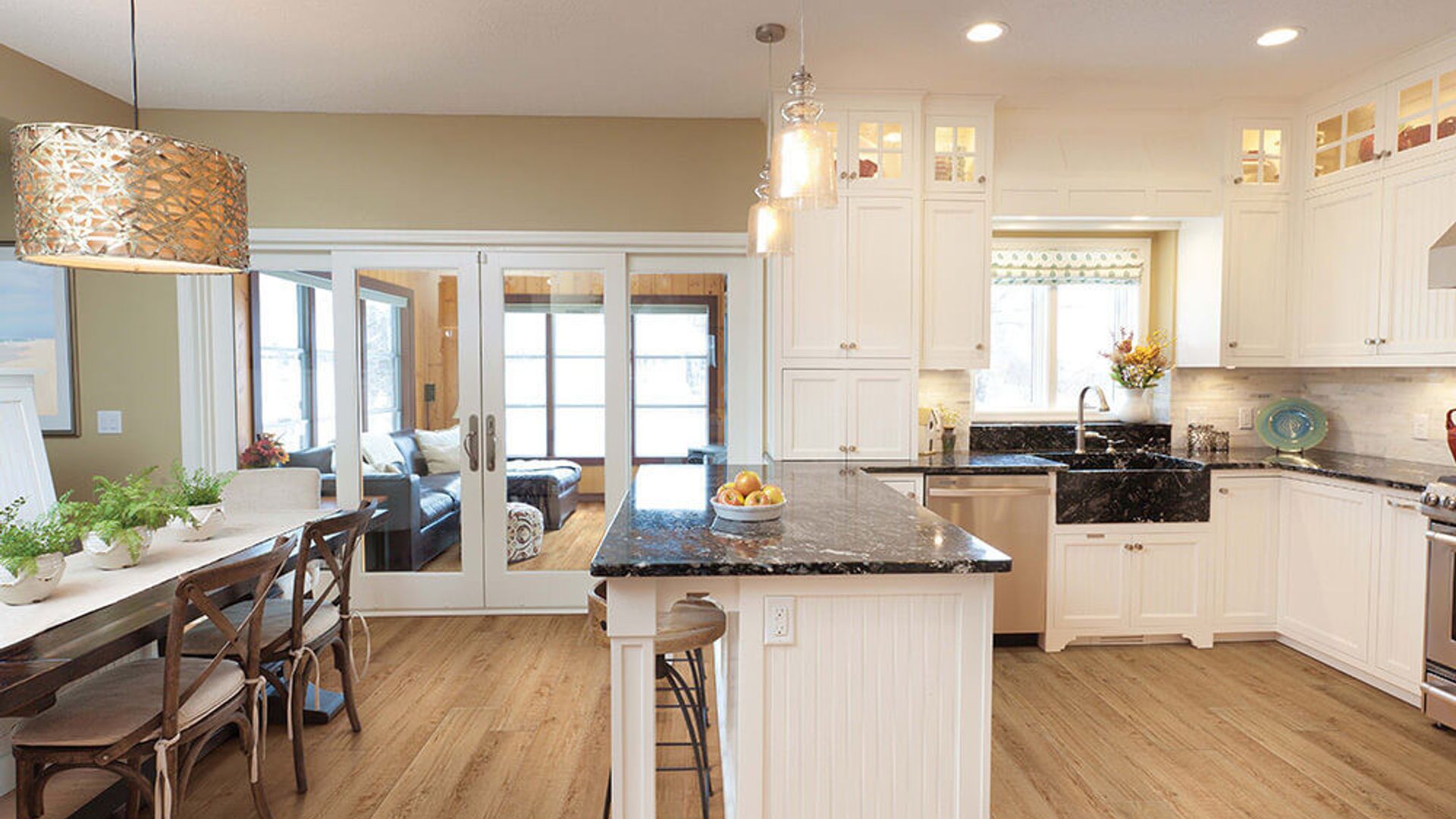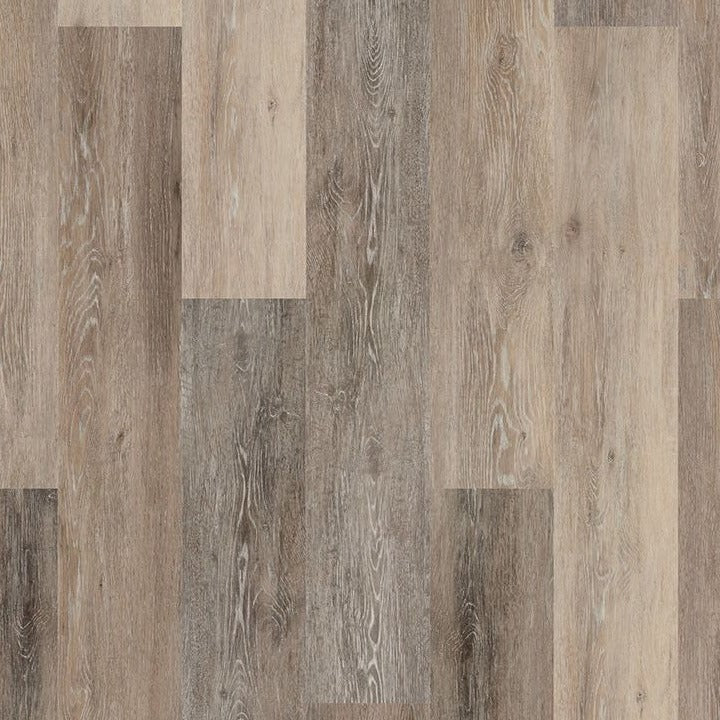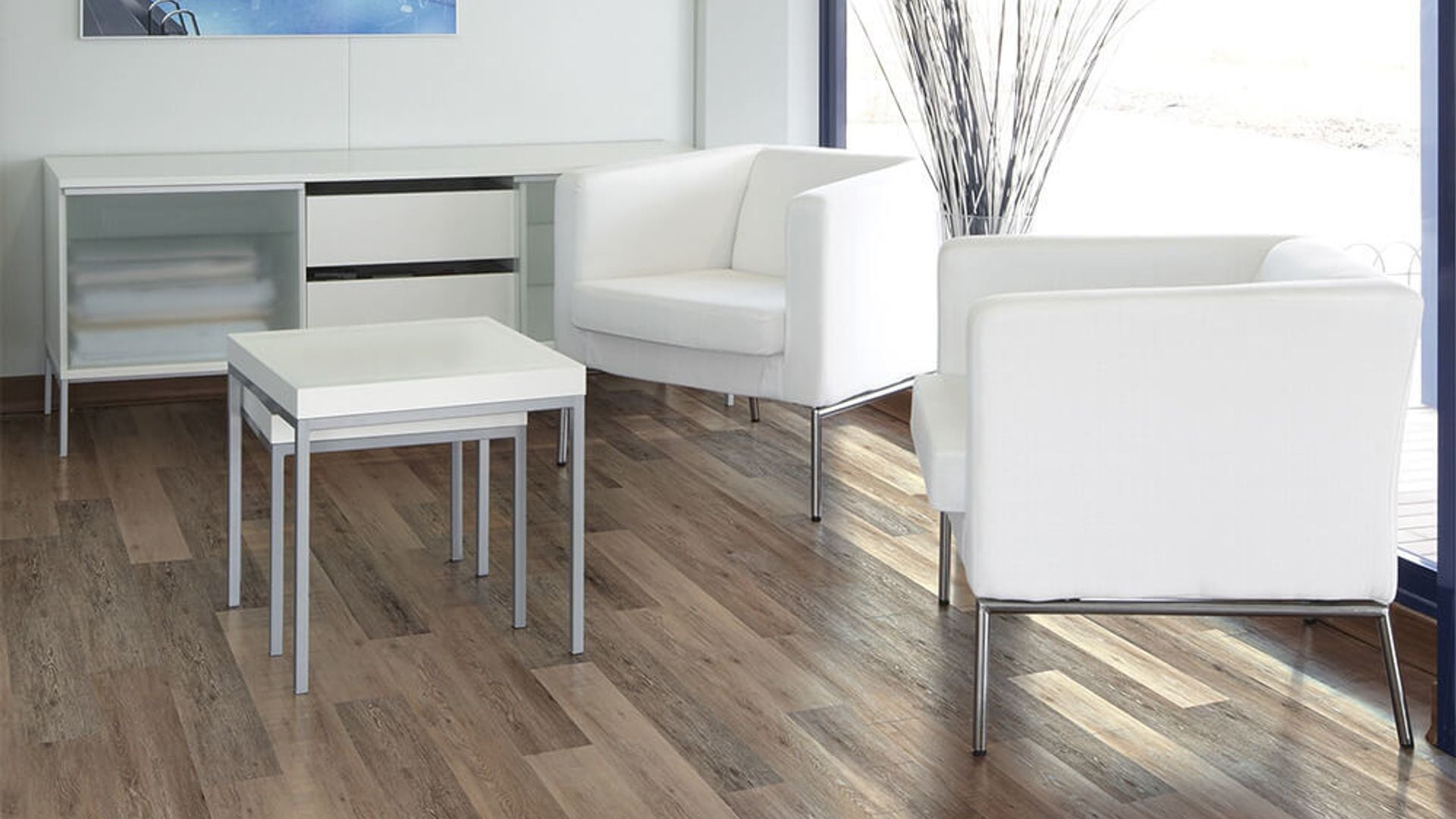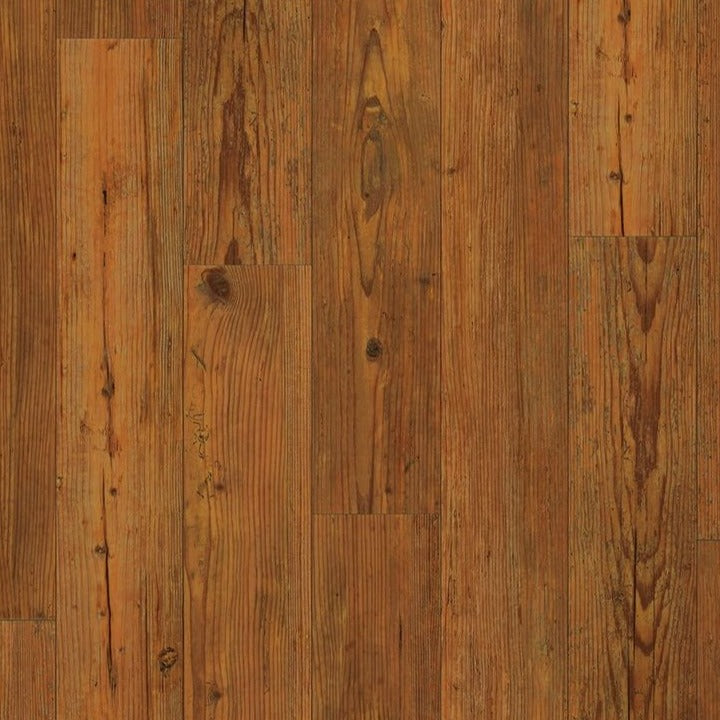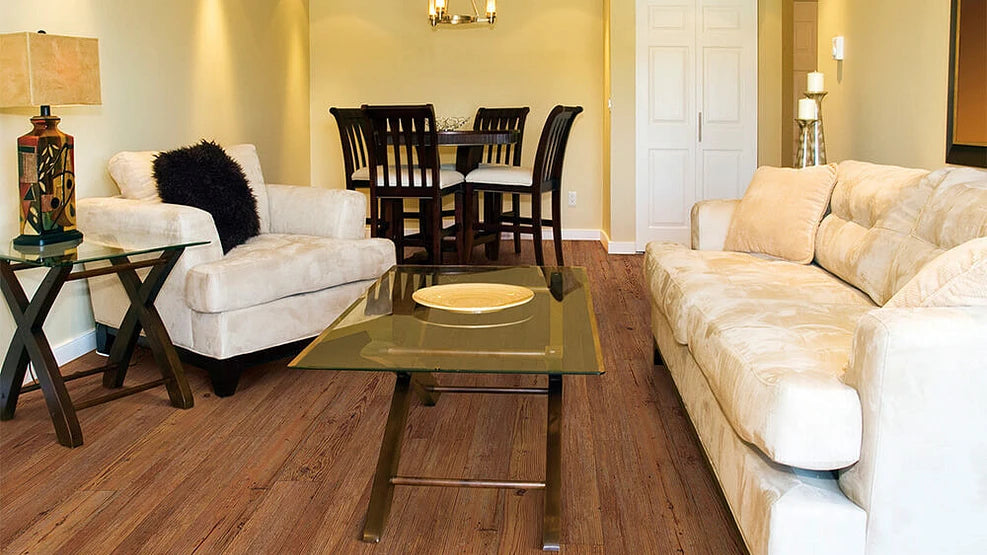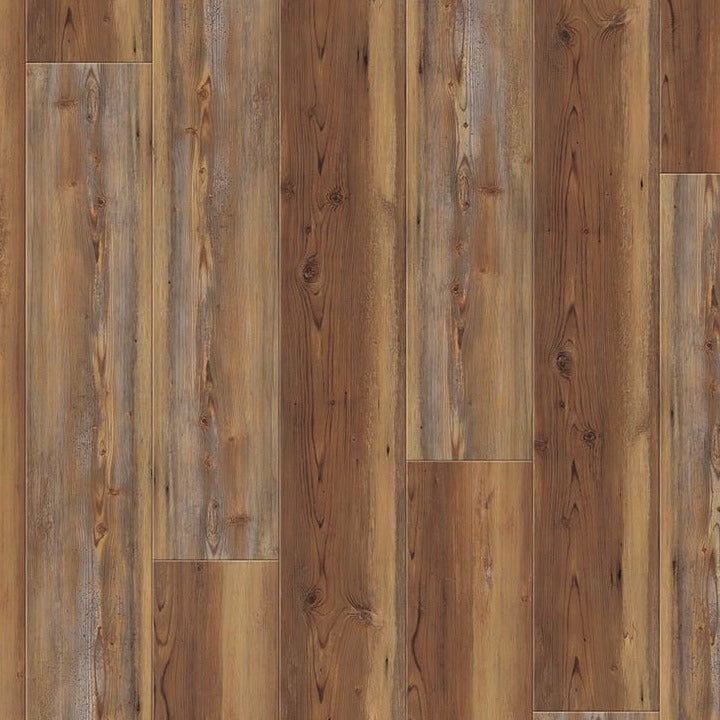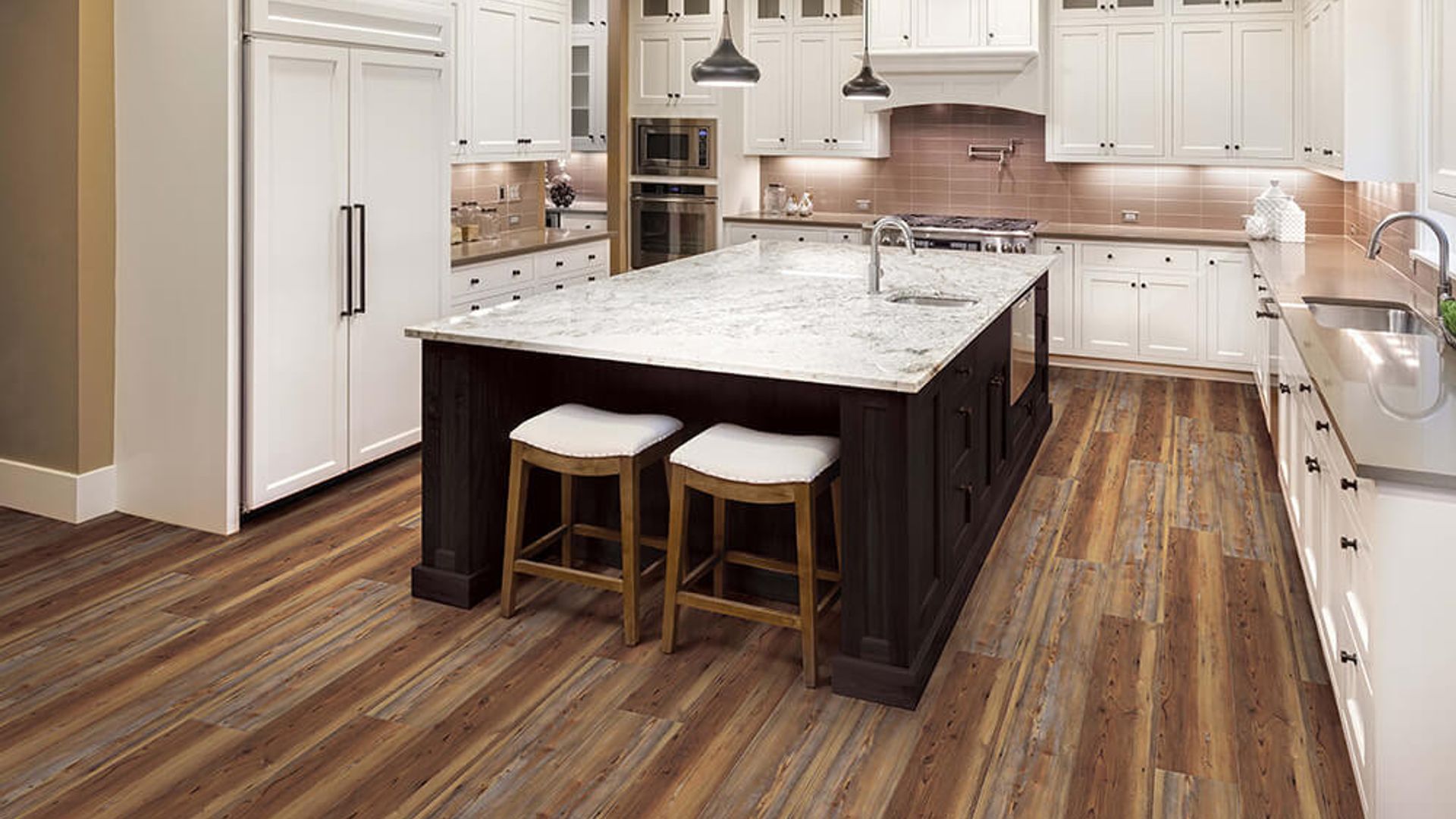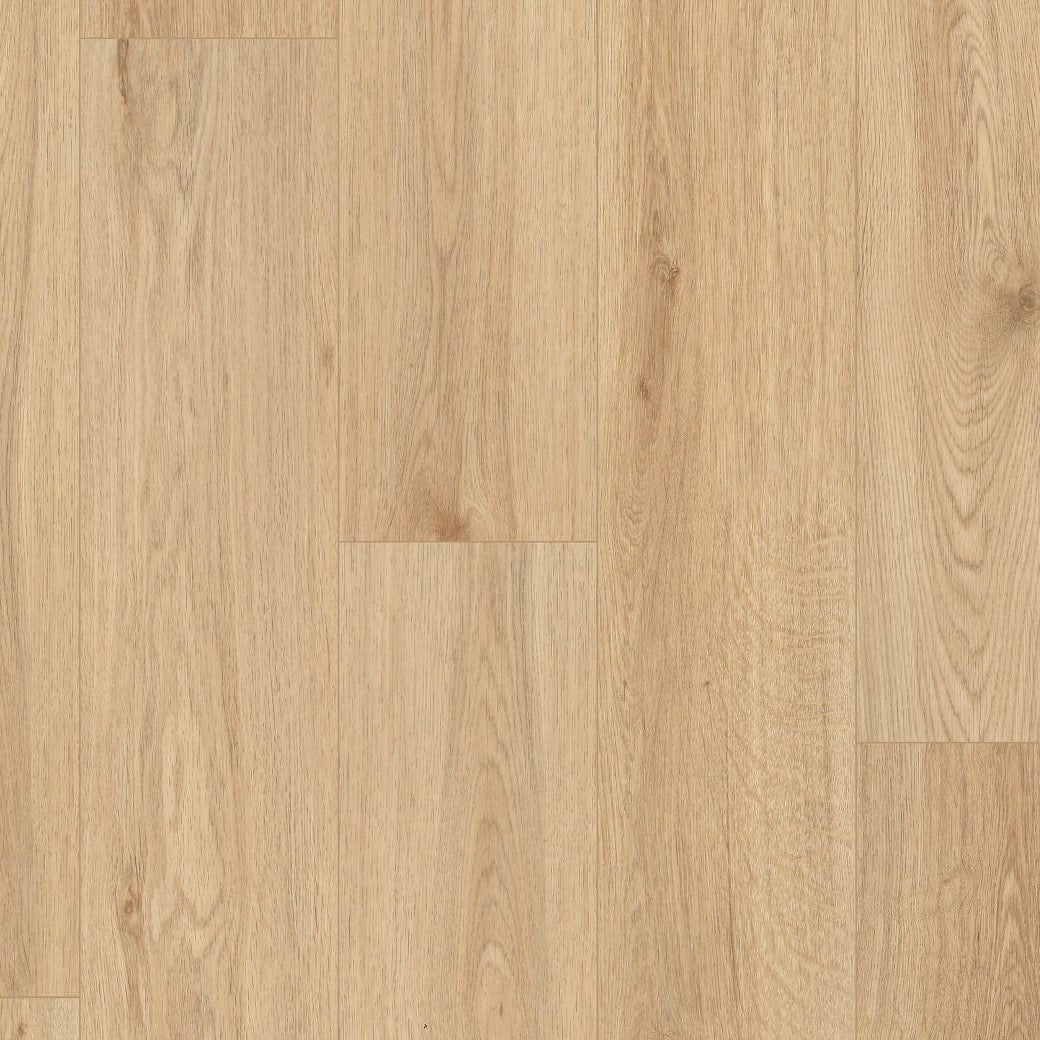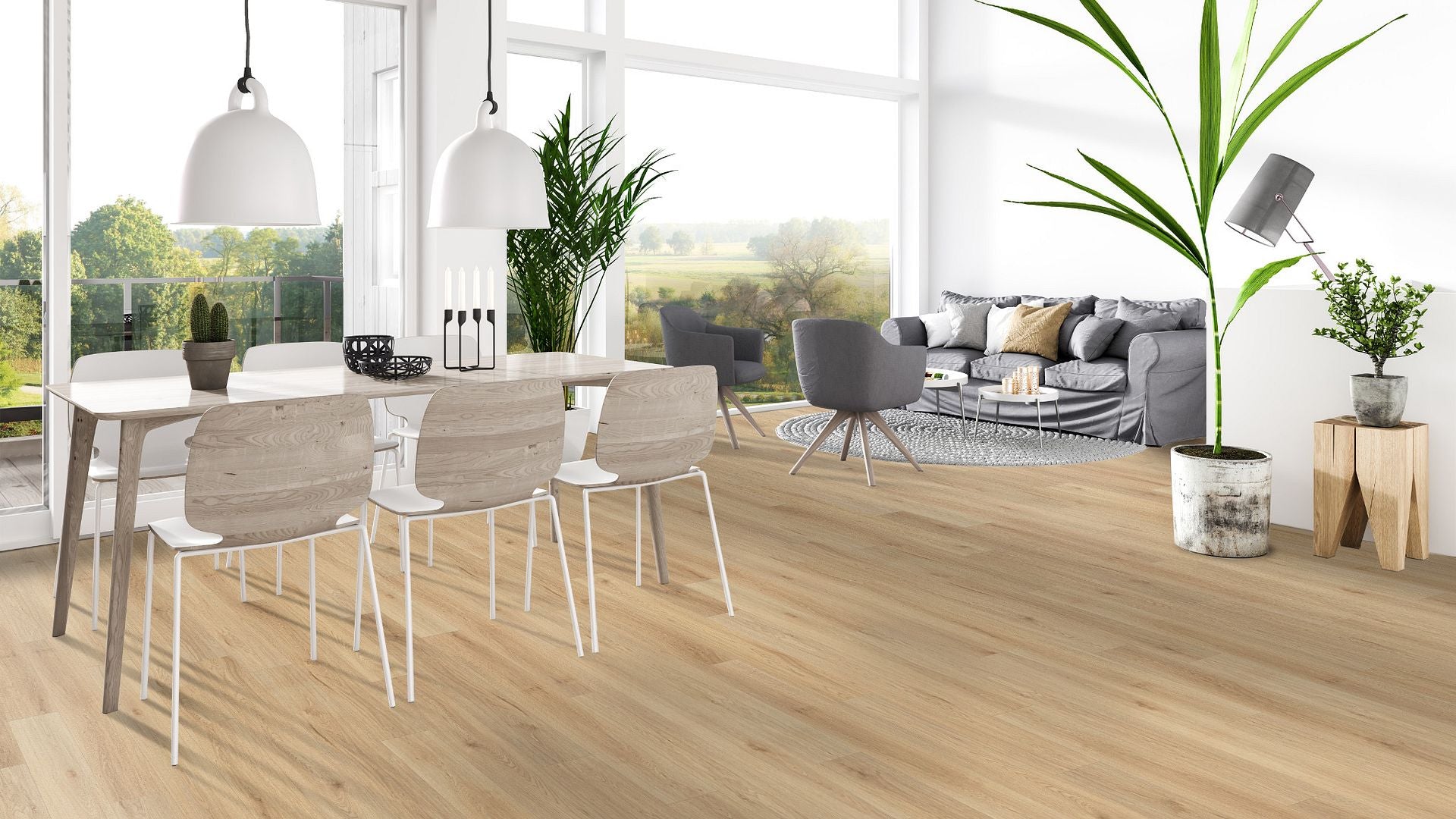COREtec LVP: #1 Luxury Vinyl Plank Flooring
[coretec-plus]
Vinyl plank flooring continues to be a popular choice in homes and businesses across the world. As a possible first-time buyer, though, what kind of questions do you have about vinyl plank's uses?
Many customers like you have a broad spectrum of questions. Take a look at the most common queries asked with thorough answers to help you make a smarter buying decision.
What is Vinyl Plank Flooring?
Those of you new to vinyl planks should know it's a sturdier form of vinyl flooring you may have used for years. Now you can get each floor piece shaped in the form of a plank to give you the look of real hardwood.
The surface is thicker thanks to the plank shape, hence often considered a premium brand. It's also more durable thanks to sturdier materials placed into each layer. Anyone who has heavy foot traffic at home or in a business can expect vinyl planks to hold up for years with proper care.
Making it more appealing is how easy it is to clean and maintain. A click-lock system is a mechanism behind the installation. You can usually get these floors installed in one day without trouble.
You'll often see vinyl plank flooring abbreviated as LVP in advertising and marketing, standing for "Luxury Vinyl Plank."
A few of the best LVP brands out there today are Armstrong, COREtec, and Shaw.
How Much Does Labor Cost to Install Vinyl Plank Flooring?
A common question asked is the cost of installing vinyl plank flooring. It's an understandable question based on the idea that not everyone has the natural prowess to install a floor.
While the click-lock feature is relatively easy to use (using a tongue and groove system), it's sometimes best to hire a professional if you're new to this.
The cost of hiring labor to install LVP varies depending on who you hire. Some are more affordable than others, but most sources offer general estimates of what you'll likely pay.
Home Depot says it usually costs $2-3 Per Sq. Ft. Add in the cost of materials besides at the same rate.
Depending on how large your rooms are, it could cost hundreds of dollars. Still, the cost you put into a professional installation is going to save money in the end. If you make a mistake or cause damage on your own, it could mean paying even more for a replacement or fix.
What is Better: Laminate or Vinyl Plank Flooring?
The debate over whether laminate or vinyl plank flooring is better has no definitive answer. It all depends on what your particular flooring needs are in your home or business.
Laminate flooring has numerous strengths and similarities to vinyl plank. It has the look of real hardwood like vinyl plank flooring does. Both are durable and are easy to install.
A key difference comes in laminate being a little more limited in where you can place it due to lesser moisture resistance. Vinyl planks can go in virtually any room of your house.
Another difference is laminate has a core of wood byproducts and bonded resins. In comparison, vinyl planks have a harder top surface, making it better when you have considerable floor traffic.
While some will say laminate has a more realistic appearance of wood and natural materials, vinyl planks give you more robust qualities. When you need a protective floor for years to come, vinyl plank usually wins the argument in this category.
What Goes Under Vinyl Plank Flooring?
You may be wondering what kind of underlayment goes under vinyl plank flooring to add more comfort. Adding an underlayment also helps with sound control, something important in flooring within noisy environments.
If you have a thicker version of vinyl plank flooring (generally over 4mm), you can safely use an underlayment without affecting the floor's strength. Most people use underlayments strictly for the sound absorption aspect.
Those of you with a house full of kids and pets already know loud sounds can be ear-piercing. Many of the best vinyl plank brands offer underlayment with the product. Other brands may request you to buy the underlayment separately.
Either way, it's easy to install an underlayment first. Whether loud sounds come from people/pets at home, or through equipment in a business, consider your vinyl plank underlayment seriously.
What is Luxury Vinyl Tile (LVT) Flooring?
You may be asking what the difference is between regular vinyl plank flooring and Luxury Vinyl Tile you often see marketed in flooring stores. LVT is very similar, except you're getting the floor in the shape of a tile.
LVT also provides the looks of stone or ceramic rather than wood. It's why flooring companies always distinguish between LVT and LVP. With LVP, you're specifically getting the realistic look of hardwood.
Whether you want LVT or not all depends on what aesthetic you're going for at home. Would you prefer the look of stone instead to match your surroundings?
Keep in mind you can still get some wood styles in LVT, so don't think it's limited to just ceramic or stone. Sometimes this creates confusion. Nevertheless, if you want more variety in the looks of wood, LVP should be your focus.
Installation is fairly easy with LVT, often using a self-adhesive process. Top flooring companies like Armstrong offer top-tier LVT, as well as LVP.
How Durable is Vinyl Plank Flooring?
No matter the brand of vinyl plank flooring you buy, it's one of the most durable floors on the market. It's only that way thanks to vinyl being one of the strongest materials available.
While vinyl is only one part of why LVP is so durable, it's why synthetic materials like vinyl have become so popular in the flooring industry. Using real wood or stone just doesn't hold up as long when subjected to heavy usage.
Residential and commercial versions of LVP are available. Now you can set up your home or business for some serious traffic without the worry of wear marks after a short time.
Whether that foot traffic comes from your children, from party guests, business associates, or customers, the durability here is in the wear layer. The thick wear layer helps make these floors scratch and stain-resistant as well. And, the central core helps make it waterproof.
What is the Best Luxury Vinyl Plank Flooring?
Three flooring brands exist that currently manufacture the best vinyl plank flooring on the planet. You can sort them all into a "Big Three": Armstrong, COREtec, and Shaw.
Armstrong is, arguably, the leader in vinyl plank flooring thanks to their attention to durable, multi-layer construction. The materials they use help bring scratch, stain, and water resistance in abundance. Various product brand names exist under the Armstrong name, with Vivero Best considered one of the top choices, mostly for commercial use.
COREtec is another major leader and owned by the third top floor manufacturer: Shaw. COREtec vinyl plank has four distinct layers of protection, including being quieter to walk on due to a cork underlayment. Its sound control is also worth mentioning. Plus, it's easy to install over most hard floors.
Shaw still sells their own brand of vinyl plank flooring called Floorte. Their rigid construction is well-noted in the industry for extra durability. They also have more styles of colors and styles than their competitors. Another plus at Shaw is they use virgin vinyl, a more green alternative to using regular vinyl, including holding up longer.
Deciding one brand over the other is all a matter of determining your own particular flooring needs. Shaw is great if looking for a more organic vinyl plank floor. COREtec is perfect for noisier environments. Armstrong is best if your floor is really taking a beating and you don't want to replace it anytime soon.
What Brand of Vinyl Plank Flooring is the Best?
Once again, finding the best vinyl plank flooring has to go on what you need for your business or home. It's not to say you can't find many critics who find favorability toward a particular LVP brand.
One could say COREtec is the best because it adds so many more features compared to the others. The sound control aspect is more important than many initially realize.
Loud sounds in a business can often annoy customers. A floor that's able to absorb or lower those decibels is ideal. The same goes for your home when you have a house full of raucous kids or pets.
Resistance against chips and dents is another plus on COREtec. And, the surface is designed for easier cleaning.
COREtec solves many of the biggest problems plaguing floors, including being protected from moisture. On top of it, COREtec has an aesthetic beauty often standing apart from the competition.
Being able to install COREtec over any hard surface is yet another factor in why so many love it. You don't even have to acclimate it to room temperature as you do with similar flooring brands.
Where to Buy Vinyl Plank Flooring?
You can find vinyl plank flooring in any home goods store selling flooring products. One of the most common places to get vinyl plank flooring is in box stores like The Home Depot or Lowe's.
While these are common places to go buy a floor, they aren't necessarily the best. Take a look at some reasons why:
When you go into a store like Home Depot or Lowe's, expect to pay full retail price for all flooring brands. They do this to make the maximum amount of profit. As such, these are not places where you'll enjoy any discounts.
Another issue is if you have questions about your floor purchase, the hired help doesn't always know the answers. Many times, these stores hire people without extensive training in their particular departments. Experience is everything when working with customers who need floors.
A scenario like this may not be common in every similar store. However, if you want to save money, it's best to turn online to specific flooring companies.
You can also find a wider selection of vinyl plank going online, particularly through specific stores. Floor City is one of the best examples, including providing options to ship flooring to any part of the United States.
Another unique aspect about Floor City is it has real flooring experts ready to answer your questions. This is a huge contrast to the stores above that may only hire workers with limited knowledge.
Floor City can answer any question you have about vinyl planks with experts who've worked in flooring for years. Best yet, shipping is fast, including being able to have plank samples shipped to you before a final sale.
With many flooring discounts available at Floor City, there isn't a better online source to buy from. Check out the extensive inventory of vinyl plank flooring through the online store.
How Thick is Vinyl Plank Flooring?
The thickness level of vinyl plank flooring is what keeps it so durable. You can also call this the wear layer. When you know the thickness of the wear layer, you'll have a good idea of how long the floor is going to last under the harshest conditions.
Vinyl plank thickness can range from 2mm up to 8mm. Any of these could be suitable since it's often more than the thickness level that determines how long it lasts.
Be sure to check to see if the floor has a urethane layer on top. It's here where you get most of the protection against wear. Still, take time to measure how much floor traffic your floor may receive before deciding on the wear layer.
An 8mm vinyl plank flooring is very thick and works better over most subfloors. With proper maintenance once per week, expect a thicker vinyl plank floor to last for a couple of decades.
Don't think vinyl plank floors with less thickness are worthless. You may have a home that hardly gets any floor traffic. For instance, if you live alone right now, a 2mm floor works well while giving you aesthetic beauty in your living environments.
How Much Vinyl Plank Flooring Do I Need?
You need to measure your rooms to determine how much vinyl plank you'll have to buy. To properly determine this, take some time to learn how to calculate square footage.
This isn't too hard and only requires a tape measure and simple math.
Take your tape measure and measure the length & width first. Multiply those figures together and you'll see the result for area (or square feet).
Keep in mind you may need to calculate separate areas of a room if it has an irregular shape like nooks. Simply do another measure for length and width in those spots and add the figure to your total square feet total.
Always buy five to ten percent more planks than necessary. The reason is you may make mistakes during the installation process, hence wasting some pieces. You don't want to run out of planks if an installation faux pas happens more than once.
Now you can shop with confidence in knowing exactly how much square footage of plank you need for each room.
How Do You Measure Vinyl Plank Flooring?
You already know how to measure square footage. What about measuring the length of each vinyl plank piece? Most planks run anywhere between 3 or 4 feet in length and 4 to 6 inches wide.
Knowing this gives you a better idea of how to measure to place those planks in a room. Sometimes it may mean cutting a piece to fit appropriately. Simply use a utility knife, but always use your tape measure to mark where to cut.
Something else to remember in measuring your floor space is any room more than 40 feet long or 25 feet wide is going to require a transition piece. Most flooring outlets give these to you.
How Much Does Vinyl Plank Flooring Cost?
The cost of vinyl plank flooring is going to vary based on where you buy it. A purchase at a place like Home Depot or Lowe's is going to mean paying full retail.
Ordinarily, vinyl plank flooring sells for anywhere from $1 to $6 per foot. If you want real quality, paying on the upper end is the better bet. Through a discount store like Floor City, you could pay half the usual retail price.
You'll likely have to spend beyond just the planks. Other accessories may be required, including an underlayment, plus investing in tools for installation. Other accessories may include transition strips, stair noses, and cans of adhesive as just a few.
A professional installation also means paying for the cost of labor. It might cost you $1.50-$2.75 per square foot as an average installation charge. Add to this if you need vinyl planks installed over stairs or whether you do a glue-down method.
Remember, you also need to remove your old flooring first. Factor this into the cost as well.
In the end, you're going to save money shopping for vinyl plank through an online discount store with knowledgeable staff.
What Underlayment is Recommended for Vinyl Plank Flooring?
You may be wondering if you really need underlayment for your vinyl plank flooring. It's a good idea if you want to add more comfort to your floor, including bringing better sound absorption. Also, if the subfloor is made of hardwood or concrete, an underlayment is more necessary to add extra softness.
The only exceptions here would be if you have a cushioned floor or tile on the subfloor. These add enough cushioning where underlayment would simply be unnecessary.
Another good reason to use underlayment is for extra moisture protection. On a concrete floor near a spot prone to moisture, underlayment is a smart idea.
When you start to install your underlayment, make sure the subfloor is clean and dry. Without doing this first, mold or mildew could develop under the installed planks, causing problems that would require repair later.
To install underlayment, you don't have to glue it down in most cases. You just have to install in the opposite direction of the vinyl planks. Leave two inches around the room's edges and siding.
Two superior underlayment products are available. One is Shaw's Bravo III underlayment that comes in a 200 sq. ft. roll. Its dimensions are 60" x 40'. At Floor City, you can get this for only $87.99.
The other is Armstrong's S1841 Quiet Comfort Floating Floor Underlayment. This comes in a 100 sq. ft. roll. Price at Floor City is a little cheaper at $54.99.
These come with a limited lifetime residential warranty and a 15-year commercial warranty. Floor City also delivers these to your doorstep in only two to five days.
What are the Advantages and Disadvantages of Vinyl Plank Flooring?
Every flooring product has its pros and cons. Vinyl plank flooring has a mix of both, if far more pros overall.
Take a little time to focus on what might work for you in this flooring and what might not. Let's start with the positives:
Pros
The biggest pro of vinyl plank flooring is its durability. When you buy from Armstrong, COREtec, or Shaw, expect the thickest versions of these floors to last nearly a lifetime.
In more specific terms, this usually means up to 20 years. Putting in a little maintenance and cleaning once per week, chances are you'll never have to replace the floor.
Then again, if you're still around when the floor eventually does wear out, it's easy to remove each plank based on the click-through method.
More benefits:
- Most vinyl plank brands protect against scratching and scuffing. Armstrong, for instance, uses Diamond 10 Technology, a process using the materials of real diamonds.
- Many vinyl plank brands are protected against moisture. Using the most robust versions, you could even have a flood and salvage your floor. Simply remove the planks, let them dry, then put them back in place.
- Versatile styles and looks work in virtually any type of room. While some brands offer more color choices than others, any of the above brands provide you with plenty of options. Colors range from overly basic to vibrant and daring.
- It's comfortable to walk on, one of the strong suits of vinyl. Adding the cork underlay, you can walk on your floor in bare feet all day at home and never feel uncomfortable. In many ways, it feels like a low-pile carpet without worry about carpet maintenance.
- Vinyl plank is also warm to the touch, something ideal in colder climates. Acclimating to room temperature is easier for these floors based on the materials used. And, with more people using vinyl plank in their bedrooms, having a warm floor in there is imperative during the winter. Getting up to go to the bathroom in your bare feet demands a floor not feeling like an ice cube at night.
- Maintaining vinyl plank is as easy as it gets. You do need to clean every week (doing basic sweeping or mopping), though that's it, really. Some of the brands offer special polish you can use in later years to help restore the look of the surface.
Cons:
- You might experience a little fading on the floor surface if it's exposed to too much sunlight. Before you install vinyl plank, check out how much natural light the room might have in the years to come. Despite this not deteriorating the floor, you want to avoid any surface fading.
- If you live beyond the time of installing the floor, it'll need to be replaced eventually. Usually, this is after 20 years following proper maintenance. Maybe by this time, your children or grandchildren can replace it if you're retired. Whatever the scenario is, a replacement is not too complicated thanks to most brands offering a floating floor.
How Long Does Vinyl Plank Flooring Last?
As you already know, vinyl plank flooring lasts a long time when proper care is given to it. Just how long that is may vary based on the amount of maintenance you provide.
A good gauge of this is to look at the warranties for most vinyl plank brands. All of the big three flooring manufacturers offer warranties up to 25 years for the thicker versions of this floor.
Commercial varieties have lesser warranties based on the idea it'll likely wear out sooner than 20 years. Even then, buying a brand like Armstrong's Vivero Best still gives you a decade or more of durability with daily traffic.
Sure, many people will say using real hardwood is better and lasts for decades longer. Just consider how much upkeep you'd have to put into real materials like wood or stone. Chances are, you might not have time to, making a real hardwood floor deteriorate faster than vinyl plank flooring.
It's no wonder vinyl has replaced real hardwood of late as a floor easier to care for, and potentially lasting just as long.
As always, estimate how much floor traffic your floor is likely to get. Doing this gives you a better idea of how long it may last at its maximum level.
What is Floating Vinyl Plank Flooring?
A floating floor might sound like magic, but what it really means is an installation using a click-lock method. This is how most vinyl plank flooring is installed.
The reason the term "floating" is used here is based on how it essentially floats ever so slightly above your subfloor without glue or tape. Yet, thanks to the thickness level of the floor, it doesn't feel like you're sinking as you walk on it.
Keep in mind the "float" is very slight in length and not in inches. It's still comfortable to walk on and easy to install. You're better off using the floating floor variety in smaller rooms, though, since rolling traffic could lift the floor away from the subfloor.
Most customers love the floating floor method of installation for vinyl plank. It's not to say some brands don't offer an adhesive option. For a bigger room, this is recommended so the floor is firmly fastened to the subfloor to withstand heavier traffic.
The only downside to using adhesives is it's more complicated to apply during an installation. You may have to hire a professional when using adhesives to ensure it's applied correctly.
Installing a floating vinyl plank floor is moderately easy when following directions carefully. There is a bit of an angular fitting technique to it you'll have to learn. If you've never installed a floor before, it's a good idea to let a professional also install your floating floor.
What Do I Look for in Vinyl Plank Flooring?
Vinyl plank floors have so many features, it pays to read up on what you might need for your living space. Some things you'll want to look into include the mil layer, thickness level, plus the often natural properties bringing protection against the elements.
Mil Layer
The mil layer of vinyl plank flooring is a little different from what floor makers deem "thickness level." A mil layer is essentially the wear layer, one of the most important elements of vinyl plank. It's the one part of the floor determining how long the floor is going to last.
These wear layers are measured in mil, otherwise measured as one-thousandth of an inch. Many people confuse "mil" with millimeters, and it's nowhere near that in the metric system.
The higher the mil layer, the better it'll hold up over time. Those of you with pets and kids will want something at least 12 mil, preferably closer to 20 mil.
Thickness Level
You might think mil layer and thickness are the same. They aren't since thickness goes by the total thickness of the product.
To measure the overall thickness, you finally do go by millimeters. Thickness might range from 4mm up to 8mm, with the latter not necessarily being the thickest you can find.
For a complete picture of how thick your vinyl plank floor is, take into consideration the wear layer, the inner core of the product, plus the backing.
Waterproof Qualities
You want a vinyl plank floor that holds up to moisture in the most thorough way possible. All the top brands offer waterproof qualities. However, there is a difference between water resistance and waterproof.
Most vinyl plank flooring is water-resistant, meaning it won't be ruined with moderate amounts of moisture in places like bathrooms or kitchens. The thicker versions of vinyl plank are more waterproof, which means salvageable if the entire room floods.
Since you can remove the planks easily through the click-lock feature, it's possible to let the wet planks dry and put them back in place later.
Color Varieties
All the top flooring brands offer a variety of colors and textures to choose from. You have nearly every choice possible in the spectrum, including some with a unique mixture of colors.
Various wood species are available as well. You can even enjoy the look of some rare wood species, all based on a printed digital image on the floor's surface.
What makes this convenient is the images, colors, and textures, are going to look better than real natural materials. Your guests will wonder how you keep the surface of your floor looking so vibrant.
Commercial or Residential?
Are you buying vinyl plank for your home or a business? There is some crossover potential here. Some homeowners spend a little more on the more robust commercial version of vinyl plank.
If you think your home is going to be a madhouse of foot traffic every day in the foreseeable future, a commercial version is perfectly acceptable.
In the chance you're living alone and only have moderate residential traffic, a residential version at a slightly lower cost is best. Besides, you're going to get a longer warranty sticking with planks made strictly for residential use.
Size
Again, measure the length and width of the rooms where you plan to install vinyl plank flooring. Planks come as small as 3-4 ¾ inches to a large 18 inches x 18 inches.
Some vinyl plank brands let you customize the size you need. We all know some rooms are unique and not designed in a standard way where everything fits perfectly.
What is the Best Thickness for Vinyl Plank Flooring?
Determining the thickness level you need in vinyl plank flooring goes on the type of use your floor receives. An 8mm floor is one of the best on the market and more moderate in price without being deemed luxury.
Brands like COREtec Plus offer thickness on this level. It's made for businesses that need the toughest of floors. Along with the thickness level, COREtec Plus also has a 20 mil layer.
Thickness on vinyl planks can range from as low as 2mm and go up to slightly higher than 8mm. The higher you go in thickness, the denser it is, along with added comfort. Plus, a thicker vinyl plank floor helps cover up an imperfect subfloor.


